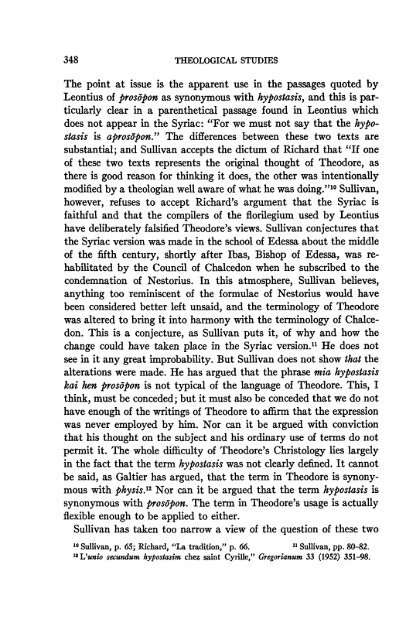ANNOTATIONS ON THE CHRISTOLOGY OF THEODORE OF ...
ANNOTATIONS ON THE CHRISTOLOGY OF THEODORE OF ...
ANNOTATIONS ON THE CHRISTOLOGY OF THEODORE OF ...
You also want an ePaper? Increase the reach of your titles
YUMPU automatically turns print PDFs into web optimized ePapers that Google loves.
348 <strong>THE</strong>OLOGICAL STUDIES<br />
The point at issue is the apparent use in the passages quoted by<br />
Leontius of prosopon as synonymous with hypostasis, and this is particularly<br />
clear in a parenthetical passage found in Leontius which<br />
does not appear in the Syriac: "For we must not say that the hypostasis<br />
is aprosopon." The differences between these two texts are<br />
substantial; and Sullivan accepts the dictum of Richard that "If one<br />
of these two texts represents the original thought of Theodore, as<br />
there is good reason for thinking it does, the other was intentionally<br />
modified by a theologian well aware of what he was doing." 10 Sullivan,<br />
however, refuses to accept Richard's argument that the Syriac is<br />
faithful and that the compilers of the florilegium used by Leontius<br />
have deliberately falsified Theodore's views. Sullivan conjectures that<br />
the Syriac version was made in the school of Edessa about the middle<br />
of the fifth century, shortly after Ibas, Bishop of Edessa, was rehabilitated<br />
by the Council of Chalcedon when he subscribed to the<br />
condemnation of Nestorius. In this atmosphere, Sullivan believes,<br />
anything too reminiscent of the formulae of Nestorius would have<br />
been considered better left unsaid, and the terminology of Theodore<br />
was altered to bring it into harmony with the terminology of Chalcedon.<br />
This is a conjecture, as Sullivan puts it, of why and how the<br />
change could have taken place in the Syriac version. 11 He does not<br />
see in it any great improbability. But Sullivan does not show that the<br />
alterations were made. He has argued that the phrase mia hypostasis<br />
kai hen prosopon is not typical of the language of Theodore. This, I<br />
think, must be conceded; but it must also be conceded that we do not<br />
have enough of the writings of Theodore to affirm that the expression<br />
was never employed by him. Nor can it be argued with conviction<br />
that his thought on the subject and his ordinary use of terms do not<br />
permit it. The whole difficulty of Theodore's Christology lies largely<br />
in the fact that the term hypostasis was not clearly defined. It cannot<br />
be said, as Galtier has argued, that the term in Theodore is synonymous<br />
with physis. 12 Nor can it be argued that the term hypostasis is<br />
synonymous with prosopon. The term in Theodore's usage is actually<br />
flexible enough to be applied to either.<br />
Sullivan has taken too narrow a view of the question of these two<br />
10 Sullivan, p. 65; Richard, "La tradition," p. 66. » Sullivan, pp. 80-82.<br />
12 \Junio secundum hypostasim chez saint Cyrille," Gregorianum 33 (1952) 351-98.
















